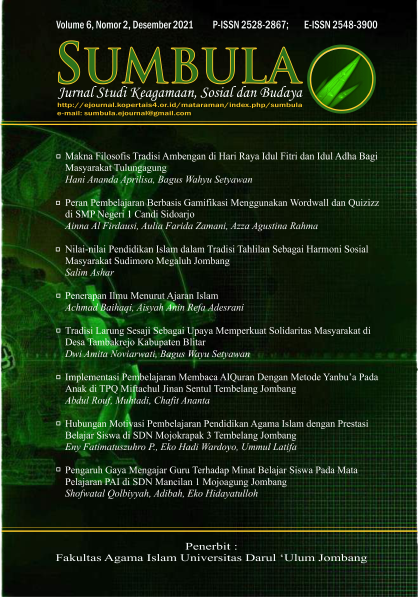Peran Pembelajaran Berbasis Gamifikasi Menggunakan Wordwall dan Quizizz di SMP Negeri 1 Candi Sidoarjo
Abstract
This research is motivated by the problem of student saturation in the learning process due to the monotonous teaching strategy. This study aims to determine gamification in BTQ learning and the role of this gamification-based learning. The subjects in this study were all grades VII and VIII, totaling 19 classes at SMPN 1 Candi.
This research uses descriptive qualitative research methods.
The results of this study are Gamification in learning lies in the development of effective strategies in the learning process implied in the depth of analysis of the conditions and available learning tools. The role of gamification in learning is able to associate feelings of fun, form collective knowledge for students, increase student motivation in doing assignments and be able to increase the tendency to actively work on assignments even with reduced accuracy due to time in games.
Keywords : Gamification, Wordwall, Quizizz, Game-based learning.
References
Al-Shara, Dr Ibrahim, ‘LEARNING AND TEACHING BETWEEN ENJOYMENT AND BOREDOM AS REALIZED BY THE STUDENTS: A SURVEY FROM THE EDUCATIONAL FIELD’, 2015
AL-Smadi, Mohammad, ‘GAMEDUCATION: Using Gamification Techniques to Engage Learners in Online Learning’, in Immersive Education, ed. by Martin Ebner, Kai Erenli, Rainer Malaka, Johanna Pirker, and Aaron E. Walsh, Communications in Computer and Information Science (Cham: Springer International Publishing, 2015), CDLXXXVI, 85–97
Ames, C, “Classrooms: Goals, structures, and student motivationâ€, Journal of Educational Psychology, 84 (3), 1992
Ames, C, Motivation: What Teachers Need to Know. Teachers College Record, 91 (3), 1990
Antonaci, Alessandra, Roland Klemke, and Marcus Specht, ‘The Effects of Gamification in Online Learning Environments: A Systematic Literature Review’, Informatics, 6.3 (2019), 32
Buell, Ryan W, Wei Cai, and Tatiana Sandino, ‘Learning or Playing? The Effect of Gamified Training on Performance’
Buhagiar, Tarek, and Christopher Leo, ‘Does Gamification Improve Academic Performance?’
Deese, Ashley. 5 Benefits of Gamification’, Smithsonian Science Education Center, 2015
Deterding, Sebastian, Dan Dixon, Rilla Khaled, and Lennart Nacke, ‘From Game Design Elements to Gamefulness: Defining “Gamificationâ€
Deterding, Sebastian, Dan Dixon, Rilla Khaled, and Lennart E Nacke, ‘Gamification: Toward a Definition’
Dickey, M. D, “Engaging by design: how engagement strategies in popular computer and video games can inform instructional designâ€, Education Training Research and Development, 53 (2), 2005
‘GamificationinEducation.Pdf’
Glover, Ian. “Play As You Learn: Gamification as a Technique for Motivating Learnersâ€, Proceedings of World Conference on Educational Multimedia, Hypermedia and Telecommunications, 2013, 2001.
Heard, Jonathan, Claire Scoular, Daniel Duckworth, Dara Ramalingam, Ian Teo, and Australian Council for Educational Research (ACER), Critical Thinking: Definition and Structure., 2020
Huang, Wendy Hsin-Yuan, and Dilip Soman, ‘Gamification Of Education’
‘KanevskyKeighley2003Toproduceornottoproduce_Boredomthehonorinunderachievement_finaldraft.Docx’
Kiryakova, Gabriela, Nadezhda Angelova, and Lina Yordanova, ‘GAMIFICATION IN EDUCATION’, 2014
Marzano, Robert J, “Building Background Knowledge for Academic Achievement: Research on What Works in Schools. Alexandriaâ€, Virginia: Association for Supervision and Curriculum Development, 2004.
Miller, M. Game Show Classroom: Comparing Kahoot!, Quizizz, Quizlet Live & Gimkit. (2016).
Namara,Damien Mac. Lisa Murphy, “Online Versus Offline Perspectives on Gamified Learningâ€, GamiFIN Conference, Pori, Finland, May 9-10, 2017.
Nett, Ulrike E., Thomas Goetz, and Lia M. Daniels, ‘What to Do When Feeling Bored?’, Learning and Individual Differences, 20.6 (2010), 626–38
Pedro Lopes, Rui, ‘GAMIFICATION AS A LEARNING TOOL’, International Journal of Developmental and Educational Psychology. Revista INFAD de PsicologÃa., 2.1 (2016), 565
Puspita Esti and R. Muhajir, “Teaching Vocabulary through Word Wall: A Qualitative Study Conducted at the Fifth Grade Students of a Public Elementary School in Bogorâ€, Journal Online Ibnu Khaldun Universitas Bogor.
Robbins, S Smith-. “This Game Sucks: How to Improve the Gamification of Educationâ€, Educause Review, 46 (1), 2000
Simões, Jorge, Rebeca DÃaz Redondo, and Ana Fernández Vilas, ‘A Social Gamification Framework for a K-6 Learning Platform’, Computers in Human Behavior, 29.2 (2013), 345–53
Zhao, Fang .“Using Quizizz to Integrate Fun Multiplayer Activity in the Accounting Classroomâ€, International Journal of Higher Education, Vol. 8, No. 1; 2019.
‘The_Effect_of_Gamification_on_Motivation_and_Engag.Pdf’
Copyright (c) 2021 Ainna Al Firdausi, Aulia Farida Zamani, Azza Agustina Rahma (Author)

This work is licensed under a Creative Commons Attribution-ShareAlike 4.0 International License.
- All material contained in this site is protected by law. It is prohibited to quote part or all of the contents of this website for commercial use without the approval of the board of editors of this journal.
- If you find one or more articles contained in Sumbula: Journal of Religious, Social and Cultural Studies that violate or potentially infringe your copyright, please report it to us, via email to Priciple Contact.
- The formal legal aspect of access to any information and articles contained in this journal site refers to the terms of the Creative Commons Attribution-ShareAlike (CC BY-SA) license.
- All Information contained in Sumbula: Journal of Religious, Social and Cultural Studies is academic. Sumbula: Journal of Religious, Social and Cultural Studies shall not be liable for any losses incurred by misuse of information from this site.






